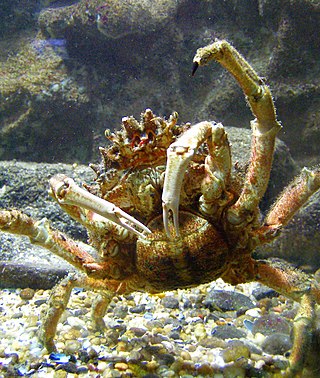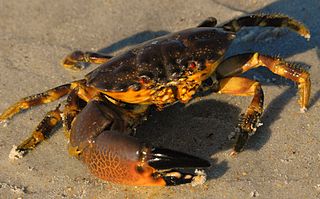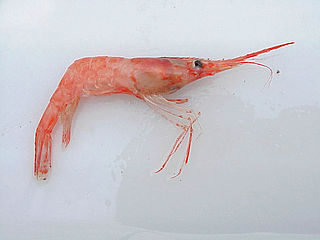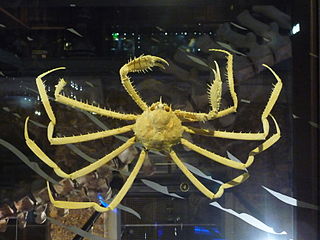
Mary Jane Rathbun was an American zoologist who specialized in crustaceans. She worked at the Smithsonian Institution from 1884 until her death. She described more than a thousand new species and subspecies and many higher taxa.

Pinnotheres is a genus of crabs, including the pea crab. Many species formerly in Pinnotheres have been placed in new genera, such as Zaops ostreus, the oyster crab and Nepinnotheres novaezelandiae, the New Zealand pea crab. The species currently recognised in the genus Pinnotheres are:

Majidae is a family of crabs, comprising around 200 marine species inside 52 genera, with a carapace that is longer than it is broad, and which forms a point at the front. The legs can be very long in some species, leading to the name "spider crab". The exoskeleton is covered with bristles to which the crab attaches algae and other items to act as camouflage.

Maja is a genus of majid crabs erected by Jean-Baptiste Lamarck in 1801. It includes the following extant species:

Palaemon is a genus of caridean shrimp in the family Palaemonidae.

Menippe is a genus of true crabs. One of the best known species is the Florida stone crab. Most of the species of this genus are found in the Atlantic Ocean.

Pugettia is a genus of kelp crabs in the family Epialtidae. It comprises the following species:
Osachila is a genus of crabs in the family Aethridae, containing three fossil species, and the following extant species:

Pandalus is a genus of shrimp in the family Pandalidae. Members of the genus are medium-sized and live on or near the seabed. Some species are the subject of commercial fisheries and are caught by trawling. One species, Pandalus montagui, lives in association with the reef-building polychaete worm, Sabellaria spinulosa.

Pisinae is a subfamily of crabs in the family Epialtidae, comprising the following genera:

The Panopeidae are a family containing 26 genera of morphologically similar crabs, often known as "mud crabs". Their centers of diversity are the Atlantic Ocean and eastern Pacific Ocean.

Achaeus is a genus of crabs comprising the following species:

Hyastenus is a genus of crabs in the family Epialtidae, subfamily Pisinae, containing the following extant species:

Platymaia rebierei is a species of crab in the family Inachidae.

Ebalia is a genus of crab in the family Leucosiidae.

Rochinia is a genus of crab in the family Epialtidae, containing the following species:

The Bay of Quinte Railway was a short-line railway in eastern Ontario, Canada. It was formed as the Napanee, Tamworth and Quebec Railway (NT&QR), chartered in 1878 by Edward Rathbun and Alexander Campbell, with plans to run from Napanee through Renfrew County and on to the Ottawa Valley. Lacking funding from the governments, development never began.
Randallia is a genus of true crabs in the family Leucosiidae. There are about 17 described species in Randallia.

Chasmocarcinidae is a family of crustaceans belonging to the order Decapoda.

















